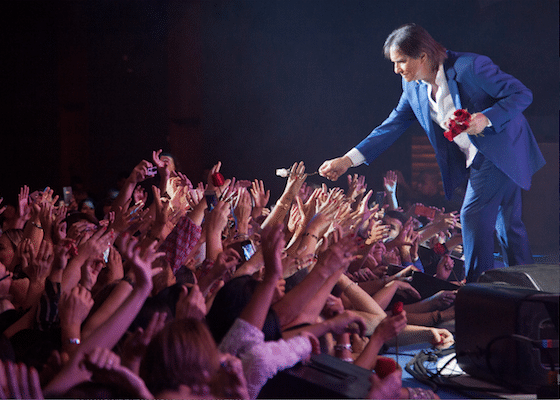It’s saying something when one of Brazil’s most famous footballers is named after someone even more famous. By the end of this month both Roberto Carlos, arguably Brazil’s best ever mid-fielder, and Roberto Carlos, the singer-songwriter superstar, will have played at Wembley stadium.
But then the facts do justify the idolatry. By 1994, with over 120 million album sales, Roberto Carlos had broken the record held by the Beatles. And he was only part way through his career.
There have been the inevitable snipes of ‘cheese’ suffered by many a Latin crooner, especially one that has an obsession with wearing blue and white. But the tide of tributes from younger Brazilian artists – Cassia Eller, Chico Science, Barão Vermelho and Skank in particular - and collaborations with other very non-cheesy superstars such as Caetano Veloso, Marisa Monte and Jennifer Lopez, have quietened his detractors.
So why is Roberto Carlos so culturally significant to Brazilians? A well-known Brazilian artist once confided to me in an interview: ‘We Brazilians love a sentimental song as much as we love a samba.’ Others say it is the way he sings these songs that sets him apart.
The key to Roberto Carlos is that in the 50s he was trained under the magic of bossa nova, in the company of Jorge Ben and João Gilberto, before switching his repertoire to rock and pop in the 60s, becoming Brazil’s first big crossover artist. Soon, the albums were pouring out and selling by the cartload, and Carlos was dubbed the King of Jovem Guarda. This new-found fame gave him the artistic freedom, in time, to record whatever he wanted, from rock to bolero.
When the right-wing military dictatorship took power in 1964, the artistic community responded with the Tropicalía movement which, in Gilberto Gil’s words, sought ‘a new perspective away from left-right binomial.” This meant unity amongst musicians and, perhaps surprisingly, the Tropicalistas who were associated with the left, supported the mass-market Roberto Carlos; his voice, his presence, was a beacon throughout the dark days of 1964 to 1989, and so he’s been regarded ever since.
Roberto Carlos symbolises unity. There is a simplicity to his voice, a rare ability to synthesise complex arrangements and melodies into a soothing tone that washes over you and is overwhelmingly appealing. This makes Roberto Carlos more relevant today than ever. Never mind the white suit; the experience of thousands of Brazilians in a stadium, forgetting their divisions and coming together in tears of joy, is a very cool thing indeed.
Roberto Carlos will make his first appearance on London since 1966, at the SSE Wembley Arena on 29th May. Tickets at comono.co.uk/live/roberto-carlos/















